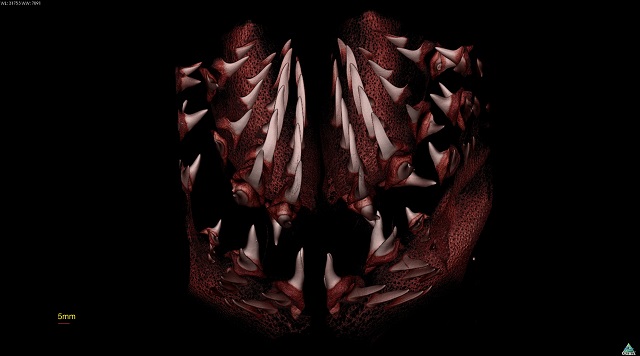Xradia, Inc., the pioneer in 3D X-ray microscopy, announced today that the first of its newly introduced VersaXRM-520 X-ray microscopes is being shipped to Cornell University’s Biotechnology Resource Center's (BRC) Imaging Facility. The instrument will be used for biological, materials science and engineering research.
This state-of-the-art X-ray instrument, the flagship of Xradia’s VersaXRM family, builds upon the capabilities of the Xradia VersaXRM-500 previously adopted by Cornell. Cornell’s Imaging Facility has already gained renown for of a wide variety of interesting and challenging samples on the facility’s VersaXRM. At one extreme, the full-sized head of a juvenile great white shark in order to study its teeth, and at the other, exotic materials and samples used in developmental biology scanned using 200nm voxels (600nm true spatial resolution). Recently, Cornell also aided the Smithsonian Institution in developing 3D images of objects in its extensive collection.

Image credit - Great white shark image courtesy of Cornell University’s Biotechnology Resource Center's Imaging Facility. Imaged by Mark Riccio, Willy Bemis, and Josh Moyer
The new VersaXRM-520 extends the boundaries of non-destructive 4D imaging with advanced contrast capabilities, extensive filtering options, and enhancements delivering greater accuracy and efficiencies. These features will be critical to enabling the Cornell Imaging Facility to form new partnerships with researchers across the university’s diverse landscape—including the Cornell Nanoscale Facility, Biological Sciences, Material Science, and Engineering colleges, as well as its industrial and commercial collaborators.
Mark Riccio, Co-Director of the Imaging Facility, says, “We're extremely excited to use the VersaXRM-520's unique capabilities to probe and explore previously un-described phenomena and structures in biology, exotic materials, and engineering.” Riccio, who is known for pushing the limits of CT imaging, added, “We are especially thrilled with the extended capabilities for wide field and variable angle modes and love the time savings we will gain with one-click set-up of those features and even faster throughput, as well as general ease of use with the new system. Even in an academic setting, our customers want more, faster, and cheaper. Now we can deliver on those requests.”
The BRC, part of Cornell’s Institute of Biotechnology, received a grant from the National Institutes of Health that enabled Cornell to be the first institution to invest in the VersaXRM-520. Researchers at Cornell University and the Rensselaer Polytechnic Institute will use the device to study the development of arthritis, metastatic cancer, congenital heart disease, diseases of pregnancy and osteoporosis.
“Previously, we have only been able to study the microstructure of bone but now we will be able to see the variations in bone structure at the same scale as individual cells, which lets us understand how those cells decide where to remove bone,” says Dr. Christopher J. Hernandez, Associate Professor of Mechanical and Aerospace Engineering and Biomedical Engineering, and principal investigator on the NIH proposal.”
“The addition of this cutting edge Xradia device to Cornell’s Imaging Facility will substantially extend our imaging capabilities and further establish us as a center of excellence,” says Dr. Jocelyn Rose, Director of the Institute of Biotechnology.
Leveraging Xradia’s synchrotron-caliber optics and industry-best resolution and contrast capabilities, the VersaXRM-520 introduces unique features that push the boundaries of already powerful Xradia imaging capability (see press release today announcing the VersaXRM-520: “Xradia Extends X-ray Microscopy to Advance Pursuit of Discovery Previously Unachievable with Lab-based Imaging.”).
Vahan Tchakerian, Vice President of Global Sales and Field Operations for Xradia, comments, “We are privileged to be associated with the Cornell imaging lab and the excellent work being done there by Mark Riccio on behalf of researchers like Dr. Hernandez. Cornell is an outstanding partner for Xradia as they challenge the boundaries of science. Already, the team there has enabled the world to see things that have never been seen before and we are very excited to see what happens when they begin to use the VersaXRM-520. We couldn’t be more pleased that they will be the first users of the new instrument.”
About Xradia
Xradia designs and manufactures microscopes for academic and industrial research applications. Xradia's solutions offer unparalleled high contrast and high resolution imaging capabilities for a large range of sample sizes and shapes. The company's heritage began in the synchrotron and extends to the laboratory. Xradia's laboratory product families, the VersaXRM and UltraXRM-L, bridge the resolution gap between micro-CT and the electron microscopy lab, delivering full volume 3D imaging down to 50 nm spatial resolution. Additional information can be found at www.xradia.com.